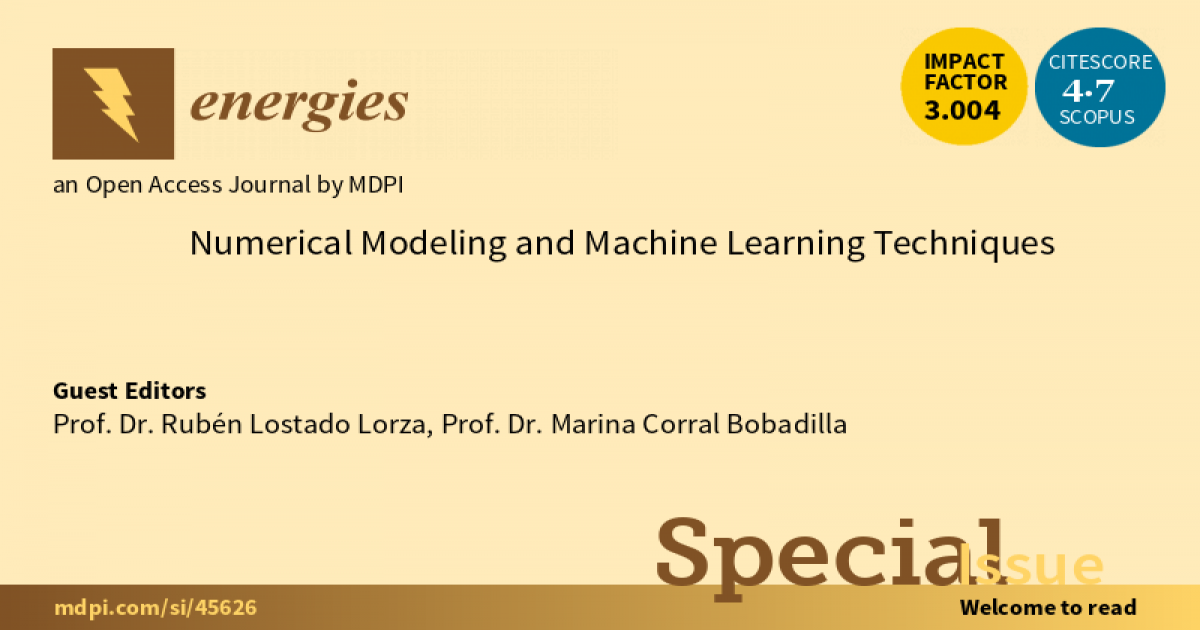Numerical Modeling and Machine Learning Techniques
A special issue of Energies (ISSN 1996-1073). This special issue belongs to the section "A: Sustainable Energy".
Deadline for manuscript submissions: closed (31 August 2021) | Viewed by 13742

Special Issue Editors
Interests: finite element analysis; mechanical design; biomechanics
Special Issues, Collections and Topics in MDPI journals
Interests: biodiesel; waste cooking oil; water waste treatment; bioremediation; biosorption; adsorption; heavy metals remove; biomass
Special Issues, Collections and Topics in MDPI journals
Special Issue Information
Dear Colleagues,
The modeling and optimization of processes or products is today one of the most outstanding points for the advancement of today’s society. Numerical modeling and machine learning techniques are undoubtedly among the most powerful methods and techniques for modeling and optimizing processes and products, reducing their cost of design and subsequent manufacturing.
The main aim of this Special Issue on “Numerical Modeling and Machine Learning Techniques” is to present new knowledge and trends using numerical modeling or machine learning techniques for modeling and optimizing processes or products. Numerical modeling techniques of interest in this Special Issue include but are not limited to finite element analysis, the finite volume method, the finite difference method, the boundary element method, discrete element methods, multibody simulation, and computational fluid dynamics. Classification, regression, and optimization algorithms could be considered in developing machine learning or Artificial Intelligence techniques.
Prof. Dr. Rubén Lostado Lorza
Prof. Dr. Marina Corral Bobadilla
Guest Editors
Manuscript Submission Information
Manuscripts should be submitted online at www.mdpi.com by registering and logging in to this website. Once you are registered, click here to go to the submission form. Manuscripts can be submitted until the deadline. All submissions that pass pre-check are peer-reviewed. Accepted papers will be published continuously in the journal (as soon as accepted) and will be listed together on the special issue website. Research articles, review articles as well as short communications are invited. For planned papers, a title and short abstract (about 100 words) can be sent to the Editorial Office for announcement on this website.
Submitted manuscripts should not have been published previously, nor be under consideration for publication elsewhere (except conference proceedings papers). All manuscripts are thoroughly refereed through a single-blind peer-review process. A guide for authors and other relevant information for submission of manuscripts is available on the Instructions for Authors page. Energies is an international peer-reviewed open access semimonthly journal published by MDPI.
Please visit the Instructions for Authors page before submitting a manuscript. The Article Processing Charge (APC) for publication in this open access journal is 2600 CHF (Swiss Francs). Submitted papers should be well formatted and use good English. Authors may use MDPI's English editing service prior to publication or during author revisions.
Keywords
- Energy and power consumed during modeling and/or optimization of processes and products
- Temperature field and strain energy
- Current, voltage, Joule effect, and electric power
- Heat transfer by radiation, convection, and conduction
- Magnetic flux and eddy currents
Benefits of Publishing in a Special Issue
- Ease of navigation: Grouping papers by topic helps scholars navigate broad scope journals more efficiently.
- Greater discoverability: Special Issues support the reach and impact of scientific research. Articles in Special Issues are more discoverable and cited more frequently.
- Expansion of research network: Special Issues facilitate connections among authors, fostering scientific collaborations.
- External promotion: Articles in Special Issues are often promoted through the journal's social media, increasing their visibility.
- Reprint: MDPI Books provides the opportunity to republish successful Special Issues in book format, both online and in print.
Further information on MDPI's Special Issue policies can be found here.






